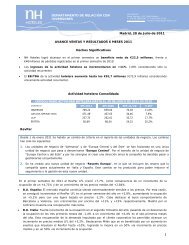Download Complete PDF - Informe Anual 2012
Download Complete PDF - Informe Anual 2012
Download Complete PDF - Informe Anual 2012
You also want an ePaper? Increase the reach of your titles
YUMPU automatically turns print PDFs into web optimized ePapers that Google loves.
2. Appointment of the Chairman and the Chief Executive Director of the Company<br />
The Executive Chairman, or in their absence, the Chief Executive Director, shall be the chief executive of the Company and as a result, their appointment<br />
or renewal shall include the delegation, when so agreed, of all Board powers and competencies that can be legally delegated, and they shall be<br />
responsible for the effective management of the businesses of the Company, always in accordance with the decisions and criteria set by the General<br />
Shareholders’ Meeting and the Board of Directors.<br />
The Executive Chairman, or in the absence of this position, the Chief Executive Director, shall have the power to execute the resolutions of the Board<br />
and, as applicable, those of the Management Committee, both of which they permanently represent with the broadest powers, being able to adopt<br />
the measures that they judge to be appropriate in the interests of the Company, in cases of emergency.<br />
3. Appointment of the Vice-Chairman of the Board<br />
The Board may elect one or more Vice-chairmen (executive or otherwise) from among the directors to substitute the Chairman in cases of delegation,<br />
absence or illness, and in general in all cases, functions and attributes considered appropriate by the Board or by the Chairman themselves.<br />
The Chairman shall be substituted by one of the Vice-chairman entrusted with executive functions in the Company, or in the absence of such a Vicechairman,<br />
by the oldest Vice-chairman.<br />
4. Appointment of Secretary of the Board<br />
The appointment and dismissal of the Secretary shall be proposed by the Appointments Committee and approved by a plenary session of the Board.<br />
5. Duration of mandate<br />
Directors shall exercise their position for a period of three years.<br />
However, directors appointed by co-optation shall hold their position until the date of the next meeting of the General Shareholders’ Meeting.<br />
The Board of Directors, if it so decides, may release the outgoing director from this obligation or reduce its applicable period.<br />
Proposals to re-elect directors put before the General Shareholders’ Meeting by the Board of Directors must be subject to a formal procedure, which<br />
must include a report issued by the Appointments and Remuneration Committee that evaluates the quality and dedication of the proposed directors<br />
to the position during their mandate.<br />
The Appointments and Remuneration Committee is the competent body for reviewing the criteria that must be followed regarding the composition<br />
of the Board of Directors and the selection of candidates.<br />
The Board shall annually evaluate the quality and effectiveness of the functioning of the Board, based on a prior report from the Appointments and<br />
Remuneration Committee, as well as the performance of the Chairman and/or Chief Executive Director of the Company.<br />
6. Removal of Directors<br />
Directors shall step down when the period for which they were appointed comes to an end or when agreed by the General Shareholders’ Meeting<br />
based on the powers legally attributed to it.<br />
Directors shall place their office at the disposal of the Board of Directors and tender their resignation in any of the following circumstances:<br />
a) When they reach the age of seventy. Directors with executive duties must cease to carry out those duties when they reach the age of seventy-five,<br />
though they many remain as directors, if the board so decides.<br />
b) When they leave the executive post with which their appointment as a director was associated or when the reasons for which they were<br />
appointed cease to exist. This shall be deemed to apply to a proprietary director when the entity or business group represented by him<br />
ceases to hold a significant proportion of the share capital or when, in the case of an independent director, he assumes an executive role in the<br />
company or any of its subsidiaries.<br />
c) When they meet the criteria for incapacity, incompatibility or prohibition established by law, or any of the other criteria established in the board<br />
regulations.<br />
d) Where they are seriously reprimanded by the Appointments and Remuneration Committee for failing to comply with one of more of their<br />
obligations as Directors.<br />
e) When their permanence on the Board may affect the Company’s good standing or reputation in the market or jeopardise its interest in any<br />
other way whatsoever.<br />
To be a member of the Board, directors must fulfil any of the situations for incapacity, incompatibility or prohibition set forth in prevailing<br />
legislation.<br />
B.1.20 State cases in which directors are obliged to resign.<br />
Directors shall step down when the period for which they were appointed comes to an end or when agreed by the General Shareholders’<br />
Meeting based on the powers legally attributed to it.<br />
In addition, Directors shall place their office at the disposal of the Board of Directors and tender their resignation in any of the following<br />
circumstances:<br />
a) When they reach the age of seventy. Directors with executive duties must cease to carry out those duties when they reach the age of<br />
seventy-five, though they many remain as directors, if the board so decides.<br />
28 ANNUAL CORPORATE GOVERNANCE REPORT
















